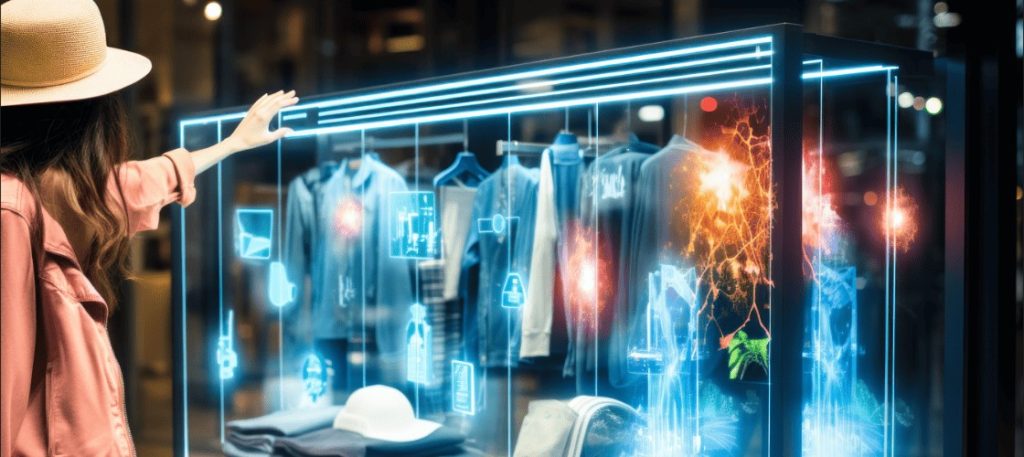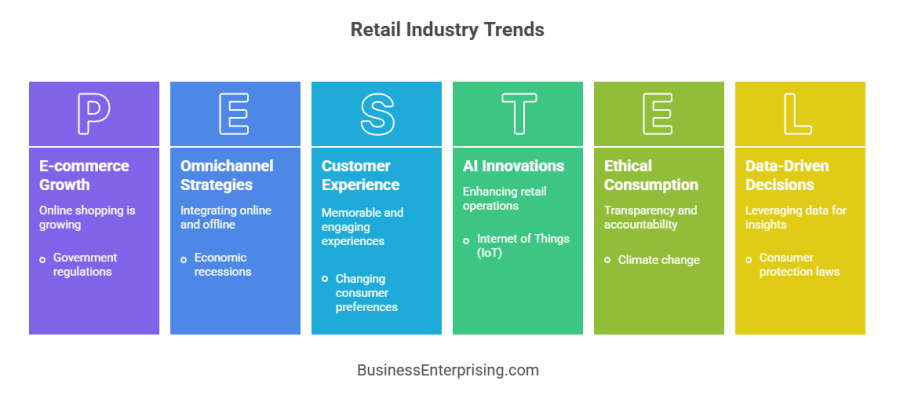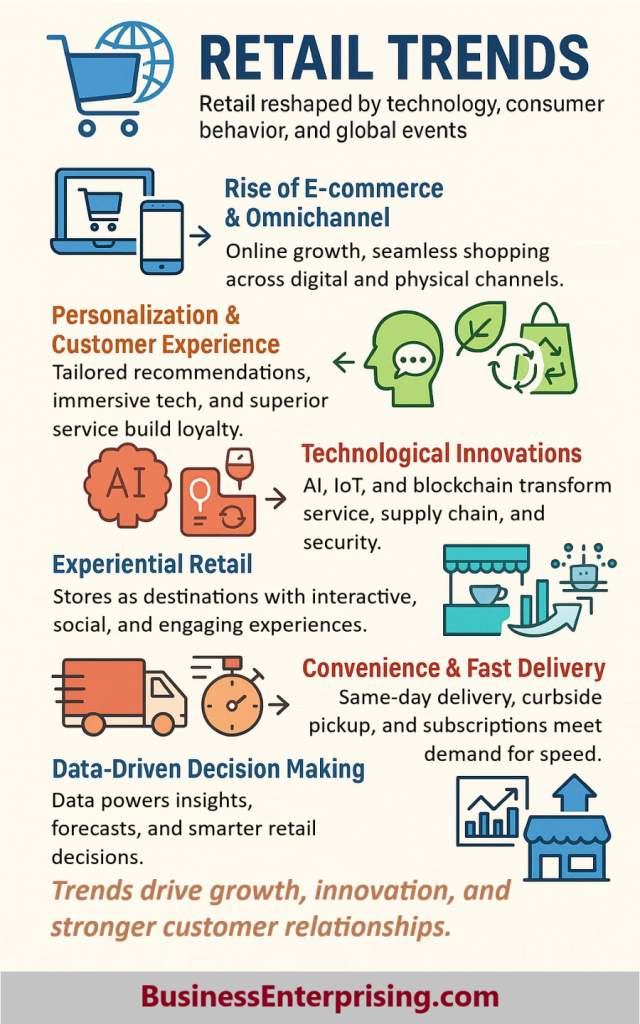 The retail industry has undergone significant transformations in recent years. These transformations have been driven by technological advancements, changing consumer behaviors, and the ongoing impact of the global pandemic. These shifts have reshaped the way businesses operate and engage with customers, leading to the emergence of new retail trends. Understanding these trends is crucial for retailers aiming to stay competitive and meet the evolving demands of their customers. This article explores the current retail trends, providing insights into how they are shaping the future of the industry.
The retail industry has undergone significant transformations in recent years. These transformations have been driven by technological advancements, changing consumer behaviors, and the ongoing impact of the global pandemic. These shifts have reshaped the way businesses operate and engage with customers, leading to the emergence of new retail trends. Understanding these trends is crucial for retailers aiming to stay competitive and meet the evolving demands of their customers. This article explores the current retail trends, providing insights into how they are shaping the future of the industry.
Rise of E-commerce and Omnichannel Retail
The rise of e-commerce has been one of the most significant trends in the retail industry. The convenience of online shopping has attracted a growing number of consumers, leading to a surge in e-commerce sales. This trend has been accelerated by the pandemic. These events had forced many brick-and-mortar stores to close temporarily and pushed consumers towards online shopping. Retailers have responded by enhancing their online presence and investing in digital platforms to provide seamless shopping experiences.
Omnichannel retail has emerged as a key strategy for integrating online and offline channels. Retailers are creating unified experiences across various touchpoints, including websites, mobile apps, social media, and physical stores. This approach allows customers to switch between channels effortlessly, providing a consistent and personalized shopping experience. For example, customers can browse products online, purchase them through a mobile app, and pick them up in-store. By adopting omnichannel strategies, retailers can meet the diverse preferences of their customers and enhance customer satisfaction.
Personalization and Customer Experience
Personalization has become a cornerstone of modern retail, and therefore, consumers increasingly expect tailored experiences that address their individual needs and preferences. Moreover, advances in data analytics and artificial intelligence have enabled retailers to collect and analyze vast amounts of customer data. As a result, they can deliver personalized recommendations, targeted offers, and relevant communications with greater accuracy. Furthermore, this trend is clearly reflected in practices such as personalized email marketing, product suggestions based on browsing history, and customized loyalty programs that reward individual behavior.
In addition to targeted marketing, enhancing the customer experience is another critical element of personalization. Consequently, retailers are placing greater emphasis on creating memorable and engaging experiences that extend beyond the transactional nature of shopping. For example, many businesses are implementing immersive technologies such as augmented reality (AR) and virtual reality (VR). These tools, in turn, allow customers to visualize products in their own environment or virtually try on clothing. Additionally, retailers are investing in superior customer service by providing live chat support, virtual consultations, and simplified return processes. Therefore, by prioritizing personalization and customer experience together, retailers can strengthen customer relationships, increase satisfaction, and foster long-term loyalty.
Sustainability and Ethical Retailing
Sustainability has become a major focus for both consumers and retailers, driven by growing awareness of environmental issues and the desire for ethical consumption. Consumers are increasingly demanding transparency and accountability from brands, seeking products that are sustainably sourced, ethically produced, and environmentally friendly. This trend has led retailers to adopt sustainable practices across their supply chains, from sourcing materials to packaging and distribution.
Retailers are also embracing the concept of circular economy, which emphasizes reducing waste and promoting recycling and reuse. Initiatives such as take-back programs, where customers can return used products for recycling, and the use of recycled materials in product manufacturing, are gaining popularity. Furthermore, brands are committing to sustainable goals, such as reducing carbon emissions, conserving water, and minimizing plastic usage. By aligning with sustainability and ethical values, retailers can appeal to conscious consumers and differentiate themselves in the market.
Technological Innovations
Among retail trends, technological innovations continue to drive significant changes in the retail industry. Artificial intelligence (AI) and machine learning are being leveraged to enhance various aspects of retail operations, from inventory management to customer service. AI-powered chatbots and virtual assistants are improving customer interactions, providing instant responses and personalized assistance. Machine learning algorithms are optimizing inventory levels, predicting demand, and reducing stockouts and overstock situations.
The Internet of Things (IoT) is another technology transforming retail. IoT devices, such as smart shelves and connected sensors, are providing real-time data on inventory levels, product movement, and customer behavior. This data allows retailers to optimize store layouts, improve product placement, and enhance the overall shopping experience. Additionally, blockchain technology is also being explored for its potential to enhance supply chain transparency and security, ensuring the authenticity of products and reducing the risk of counterfeiting.
Experiential Retail
Experiential retail is gaining traction as retailers seek to create unique and engaging experiences that attract customers to physical stores. This trend involves transforming stores into experiential destinations where customers can interact with products, participate in events, and enjoy immersive experiences. Examples of experiential retail include pop-up shops, interactive displays, in-store events, and brand collaborations.
Retailers are also incorporating entertainment and hospitality elements into their stores, such as cafes, lounges, and live performances, to create a more enjoyable shopping environment. By focusing on experiential retail, businesses can differentiate themselves from competitors, drive foot traffic, and increase customer engagement and loyalty. Moreover, experiential retail helps create memorable brand experiences that resonate with customers and encourage repeat visits.
Convenience and Fast Delivery
In today’s fast-paced world, convenience and speed are paramount for consumers. Retailers are responding to this demand by offering fast and flexible delivery options, such as same-day or next-day delivery, curbside pickup, and buy-online-pick-up-in-store (BOPIS) services. These options cater to consumers’ desire for immediate gratification and reduce the friction associated with traditional shopping.
Subscription services and membership programs are also gaining popularity, offering customers convenience and value through regular deliveries of products and exclusive benefits. Retailers are leveraging these models to build customer loyalty and create predictable revenue streams. By prioritizing convenience and fast delivery, retailers can meet the expectations of modern consumers and enhance their competitive edge.
Data-Driven Decision Making
Data-driven decision making is becoming increasingly important in retail as businesses seek to leverage data to gain insights and optimize operations. Retailers are using data analytics to understand customer behavior, preferences, and trends, allowing them to make informed decisions about product assortments, pricing, and marketing strategies. Advanced analytics tools are enabling retailers to predict demand, identify patterns, and personalize customer experiences.
Additionally, data-driven decision making is also enhancing supply chain efficiency, helping retailers manage inventory levels, reduce costs, and improve fulfillment processes. By harnessing the power of data, retailers can make more accurate and strategic decisions, driving growth and profitability. Furthermore, data analytics can help retailers identify opportunities for innovation and stay ahead of market trends.
Conclusion
The retail industry is continuously evolving, driven by technological advancements, changing consumer preferences, and the impact of global events. Staying abreast of these trends is essential for retailers aiming to remain competitive and meet the demands of their customers. From the rise of e-commerce and omnichannel retail to the focus on personalization, sustainability, and technological innovations, these trends are reshaping the retail landscape and creating new opportunities for growth and differentiation.
Understanding and embracing these retail trends can help businesses navigate the complexities of the industry and achieve long-term success. By prioritizing customer experience, leveraging technology, and committing to sustainability, retailers can build stronger relationships with their customers and create a resilient and future-ready business. As the retail environment continues to evolve, staying agile and responsive to emerging trends will be key to thriving in this dynamic and competitive market.


